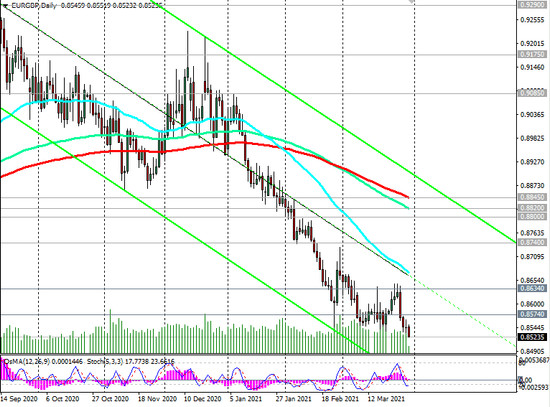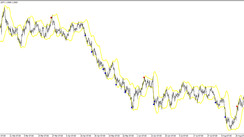Despite yesterday's decline against the dollar, the pound continues to be traded steadily in cross-pairs against other major currencies, supported by a successful vaccination campaign in the UK.
And in this respect, the most prominent is the strengthening of the pound against the euro.
The EUR / GBP has declined since the beginning of the year, i.e. over the past 3 months, by 5% against the background of both the pound, which has strengthened since the beginning of the year, and the weakening of the euro.
As of this writing, EUR / GBP is traded near 0.8525 mark, 20 pips below this week's opening price.

According to economists, in the coming days, the British pound will continue to grow against the euro on fears around the third wave of the pandemic in the Eurozone countries. The slow pace of vaccination in the Eurozone may worsen the prospects for the recovery of the European economy, while quarantine measures are being tightened in a number of Eurozone countries, but the number of daily detections of new cases of coronavirus infection continues to grow in almost all major countries of the block. In Europe, a decision is being prepared to introduce vaccination certificates. According to European Commissioner Thierry Breton, this issue can be resolved as early as July 15.
On Tuesday, experts from the European Commission reported on the growth of positive sentiment and business optimism in the Eurozone. According to the data presented, the index of sentiment in the economy, the aggregate indicator of confidence of households and companies, amounted to 101.0 in March against 93.4 in February. The indicator rallied above its long-term average for the first time since its sharp decline a year ago and approached the 104.0 level in February 2020.
Sentiment has improved across all sectors of the economy; the sentiment index in Germany at the same time updated the record of monthly growth, while indicators of Spain, France, Italy and the Netherlands also showed significant improvement.
Nevertheless, economists believe that despite the more positive-than-expected data for March, the tightening of restrictive measures will entail a contraction in the Eurozone's GDP in the 1st quarter of 2021.
Information that quarantine measures in Germany have been extended until April 18, and France has introduced new restrictions, heightened fears about the imminent recovery of the Eurozone economy.
The euro is likely to remain vulnerable in the short term, including against the pound, and the EUR / GBP pair may soon test the support level 0.8500 again.
Important macro data will be released on Wednesday for both the UK (at 06:00 GMT) and the Eurozone (at 09:00 GMT).
Economists believe that even if the data indicate an acceleration of inflation in the Eurozone in March (and according to the forecast, the consumer price index CPI is expected to rise to 1.3% in annual terms against 0.9% in February), which will be primarily due to higher energy prices, they are unlikely to affect the policy of the European Central Bank, which continues to adhere to an extra soft monetary policy.
During their recent meeting in March, ECB leaders decided to accelerate the pace of PEPP purchases. The total volume of purchases could reach 21-23 billion euros per week, which corresponds to asset purchases in the amount of 90-100 billion euros per month.
Among tomorrow's macro data for the UK - the country's GDP for the 4th quarter. Since this is the final estimate and is expected to be in line with the previous estimate (+1.0%), the pound may react to this publication only if the data differs from the forecast. The main factors that can force the Bank of England to keep rates low are weak GDP and labor market growth, as well as low consumer spending. If the GDP data turns out to be worse than the forecast / previous estimate, it will put downward pressure on the pound.
In general, there is strong downward dynamics in the EUR / GBP pair, which gives no reason to hope for an early reversal of its bearish trend.
From the news for today it is worth paying attention to the publication (at 12:00 GMT) of the Harmonized Consumer Price Index (HICP) in Germany (preliminary release).
This index is used by the Governing Council of the ECB to assess the level of price stability. A positive result strengthens the EUR, a negative one weakens it.
Preliminary forecast for March: +0.5% (+2.0% in annual terms versus +1.6% in January and February, -0.7% in December and negative values in the second half of 2020).
If the data turn out to be better than the forecast, then the euro may strengthen in the short term. The growth of the indicator is a positive factor for the euro. The data is worse than the forecast and the previous value will negatively affect the euro.





